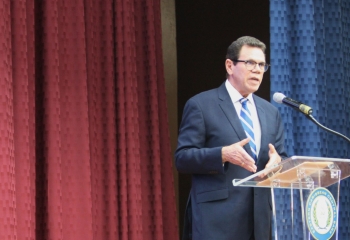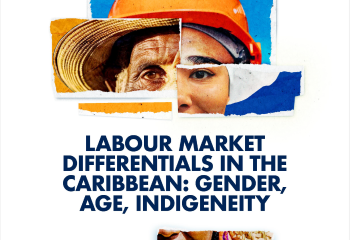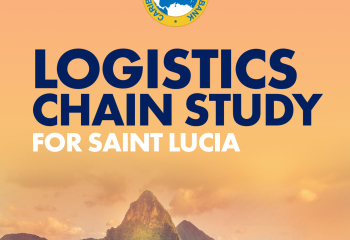Keynote: Caribbean Broadcasting Union 54th Annual General Assembly
It is an honour and a privilege to deliver this keynote address at the 54th Annual General Assembly (AGA) of the Caribbean Broadcasting Union (CBU). I last addressed this August body at the 52nd AGA and at that time noted that 50 years was a good time to reflect on the agency’s past and its potential evolution. I noted then that:
Development is a holistic concept, with solutions requiring internal integrity of the development ecosystem. In particular, we have since elaborated that the core of our approach rests on two principles: first, the definition of system must be complete and comprehensive — this embodies the linkages that exist across productive, social, institutional, environmental, and financial elements of societies. So, we cannot do development without recognising and addressing the internal coherence of whole system. Second, the dynamics of motion of the system must be such that system integrity has to be preserved over time. This suggests that any distortions in the system will eventually compromise the integrity of the definition of the system and consequently its dynamics of motion. Therefore, the attainment of any desired trajectories of development must not only ensure coherence within the system at a point in time, but consistency of systemic integrity over time.
Second, communications, as a tool, needs to be placed alongside mainstream development policies – akin to intentional economic and social policies. I posited then, that it was important to buttress the progress achieved in advocating for a free and active media with the responsibility to inform and help promote development by influencing the social psyche through the active management of content. In essence, you need to be in the forefront supporting and promoting concepts of economic growth, stability, and social cohesion that are necessary for the continued development of our Region.
Today, I want to continue that same theme of responsibility and anchor this keynote address in exploring the role of the fourth estate in the 21st century as guardians of social justice in small developing societies.
What does that mean? If we accept that social justice exists when "all people share a common humanity and therefore have a right to equitable treatment, support for their human rights, and a fair allocation of community resources” (Toowoomba Catholic Education in 2006), wouldn’t it be appropriate to declare that there cannot be development of a nation without social justice of its people? Indeed, social justice promises change, increased access to rights and dignity, and maximisation of the potential of a people.
First, the theme of social justice is fully aligned with the Caribbean Development Bank’s advocacy of a holistic, systems approach to development. Indeed, we advocate for two key principles to underlie all policies aimed at influencing behaviors for advancing development trajectories — (a) sustainability, based on strengthening resilience, and (b) inclusivity, based on narrowing inequity. Let me note that inclusivity for us encompasses social inequity, marginalised groups, and disadvantaged communities, and that the persistence of these inequities promotes tensions that distort the definition of the system. Consequently, addressing these inequities across all parts of the system is essential to attain system integrity and social justice. At CDB, we believe that for us to achieve resilient prosperity and indeed social justice for our people, we must act now, and we must do so with urgency, agility, and dexterity.
So, my thesis today is that communications has and should play a strategic role in promoting social justice and therefore holistic development. My friends, in some developed countries, the role of the media is so highly valued that it is enshrined in the constitution. While it is under attack in many of those same countries and media practitioners have been branded “enemies of the people”, thankfully we have not reached that level of dogma here in the Region.
COVID-19 has shown us that inequalities among our populations are driving the tensions that we see, and you report on in the Region. A 2021 UNDP Report[1] states that regardless of decades of progress Latin America and the Caribbean region (LAC) “remain the second most unequal in the world and countries in LAC exhibit higher income inequality than those in other Regions at similar development levels.” This statement begs the question, so what are these inequalities and how can they be deconstructed and disseminated to a weary audience tired of living the reality of the statement.
If the Secretary General would permit me a little latitude, I want to invoke the African saying of Sankofa — we are connected through time, and we can benefit from looking back to go forward. The media landscape has always been replete with courageous men and women who have placed their beliefs on the line and their very lives at risk, to advocate for the rights and dignity of others. Two hundred years ago, newspapers played a significant role in documenting the evils of slavery and advocating for its abolition. The British Library’s Endangered Archives project provides sorrowful reading on slavery alongside stories of heroic resistance. In the United States of America, Ida B. Wells, an enslaved woman who lost a suit brought against her for not giving up her seat, used a pen name to mount a blistering crusade after three friends were lynched.
Our Region is replete with stories of journalists who covered stories often at their peril. Jones P. Madeira is an icon in the Caribbean media space having worked with the BBC, the CARICOM Secretariat, and the United Nations Educational, Scientific and Cultural Organisation (UNESCO) to further the cause of regional integration through the expansion of the Caribbean News Agency (CANA) and the CBU. During the attempted coup in Trinidad in July 1990, “Jones” was held hostage and had the difficult task of telling the nation of the uprising with gunmen and other militants at his side live on air. In another instance, he led the resignation of the editorial team in a disagreement with government and publishers over freedom of the press.
Come forward to August 2019 and Nikole Hannah-Jones and other writers from the New York Times and the New York Times Magazine launched a long form features project to observe the 400th anniversary of the first enslaved Africans to arrive in the then British colony of Virginia - The 1619 Project. Despite some historical inaccuracies, the project was conceptualised to address social injustice. As Hannah-Jones told the National Public Radio (NPR) in November 2021, "Every American child learns about the Mayflower, but virtually no American child learned about the White Lion," (the slave ship that brought the slaves to Virginia). Hannah-Jones said the omission, is "symbolic of how history is shaped by people who decide what's important and what's not. And that erasure is also a powerful statement." [2]
Today, we are at that point in our history where we need to decide what’s important for our future and how do we share this message to grow? How do we revive the spirit of these pioneers? How do we become Ubuntu — using another Africa phrase to capture “I am because you are”. In other words, what is the equivalent of the 1619 Project for Caribbean media? Some may declare, and probably correctly, that many media houses have highlighted some of the ills of society, but I would argue that media reflects the context in which it exists. What is the obligation of Caribbean media in the current development crisis that confronts us?
To be clear, the media landscape has evolved, away from government-owned to mostly private owned establishments. And the global economic, social, environmental, and political landscape has seen swift and intense shifts. In the last 3 years alone, the Region has seen a global pandemic, economic shocks, and a struggle to return to the path of development goals and resilient prosperity. In small, vulnerable states, Caribbean media are particularly important to support relief and recovery efforts as well as disaster mitigation. But I fear the industry is not doing enough to educate and inform its audiences on various platforms about the multiplicity of challenges and changes that are and will continue to impact lives and livelihoods. Today, I’d like to ask what is the media’s moonshot project that will attract the interest of our people and be a call to action for behaviour change?
Let me illustrate the above by looking at two areas of interest: crime and misinformation. On any given day across the Region, we would be hard pressed not to find a chronicling of rising crime and violence. What is missing, is greater analysis into the causes of these crimes and the ripple effects across other sectors of society. I propose seeing violence not just as an opportunity to rush to social media first with pictures and text - the usual concept of “if it bleeds it leads”. Also, we may ask shouldn’t the media share the responsibility of promoting social justice and thereby development by assisting in reducing systemic tensions that arise from social inequities?
Consider this — in small societies, often with one hospital, each gunshot victim stalls the level of care available to other patients. The staff on duty in the emergency space focus all resources to save the life of that patient, whether victim or perpetrator, meanwhile patients with other injuries are triaged and put to wait, often for many hours and sometimes days. These gunshot wounds and other victims of crime increase the cost of health care, constrain other fiscal spending, and could necessitate citizens paying more taxes to support health institutions.
Diving deeper, gun crimes impact the general sense of safety for the society. Businesses close early because citizens avoid shopping late and staff need to get home. That reduces productivity and economic activity. People who participate in outdoor exercise and activities tend to do less — the knock on effect of less physical activity, coupled with poor eating habits, increases already rising levels of chronic non-communicable diseases. Any yet to be measured is the impact of lack of safety and social cohesion on mental health, and ultimately on the health care bill of the nation.
Let me underscore that I am not saying not to report on crime. However, the reporting must be accompanied by more analysis of the issues so that the citizens are aware of what drives these crimes and what work is being done by governments and civil society to reduce or mitigate crime. We cannot become desensitised to rising crime rates because they are not happening in “my” neighborhood. Narratives that suggest many of the offences happen in lower-income communities and are drug-related retaliatory actions between crime factions must be demystified. Eventually if we are not vigilant, crime comes to all our neighborhoods. I am going to be controversial. The police and the state cannot solve crime on their own — crime is not a phenomenon for someone else to tackle but one for all of us to tackle. And we do this by our contributions to the cause of advancing social justice.
Let me turn to misinformation and disinformation, an area that has the potential to truly set back our development trajectory. It is an area where the media has an enormous amount of leverage. The ubiquitous smartphone with its capacity to create and send content has changed our lives in ways that we could not have imagined fifty years ago. We saw it ourselves during the COVID-19 pandemic where people believed information sent to them via voice note or that they found while doing their own research that sent them down a rabbit hole of conspiracy theories.
In December 2022, Public Media Alliance (PMA) published an action plan to combat misinformation and disinformation for Caribbean media workers. Conducted across eight territories, highlights of the report include the need for more regional research and analysis to combat “disinformation, media literacy, and trust in news media.”[3] The report emphasised the need for a “systematic” media and information literacy awareness programme” but more importantly, the necessity of collaboration by media houses to mitigate this scourge. In May 2022, then President of the CBU Kayleaser Deveaux-Isaacs announced a partnership with UNESCO on World Press Freedom Day to reduce misinformation and disinformation in the Region. Mrs. Deveaux-Isaacs said, “It is our hope that through strategising, the exchange of experiences and tools, and collaboration amongst news, current affairs, and public service agencies, we can navigate this “Infodemic”.” [4]
In order to solve a problem, we first need to identify the issue and commit resources to put an end to it. As we say in the Bank we must “measure better to target better”. What work is the media doing to reduce the misinformation and disinformation that is now part of our daily landscape? Too often media houses are refuting this information with an audience that sees traditional media as not responding fast enough to issues arising in their communities. The PMA Report is clear — regional media must partner together.
In the past, news agencies such as CANA worked with media houses across the Region to distribute stories that were fact checked and researched. Today, international newspapers have set up divisions dedicated to this process and in some instances have titled segments in their newscasts and other media products dedicated to identifying truth, giving the audience an alternative to voice notes and video without context.
The development of Artificial Intelligence (AI) will make the harnessing of misinformation and disinformation even more urgent and has implications for the future of the media industry. Forbes Magazine, in a 2021 article, predicted that in the next fifteen years, “the majority of news will be written by AI bots.”[5] While I don’t believe that AI will turn on humanity as the computer HAL tried to do in the film 2001: A Space Odyssey, the Forbes column still makes for unsettling reading. In the article, it cites the technology Automated Insights that can cover more than 13 baseball leagues and over 140 affiliated baseball teams and turn that information into AI linguistic analytic methods. That is simply amazing!!! The writer suggests that kind of amalgamated news gathering reduces the sports reporter’s time spent on research. The challenge is to harness the research capability and access that AI produces while using the human thought to engineer value-addition to the output produced by AI — a win-win situation.
We suggest that media houses begin to prepare not only their businesses but the rest of the Region for the impact of AI on industries, opportunities for upskilling to different areas (job loss minimisation), and determine what tasks are best left for AI such as research in digitised news libraries. You may ask what about content? Across the Region, there are many reels of film, tapes, audio recordings, and newspapers deteriorating in poorly temperature-controlled rooms, while the machinery needed for playback is either obsolete or prohibitively expensive to purchase by one media house. What can we do next? Imagine the Region as one vast digital archive that has recorded the social history of our Region, a resource largely untouched. Now imagine that the region’s media houses collaborated to digitise that resource and use it as a revenue generator where for a small fee to each other, and a larger one to those with deeper pockets, the material could be re-purposed, through AI, to lend deeper context to stories, features, documentaries, and to widen the development narrative.
As the Fourth Estate, the media’s role in promoting inclusive growth and development is well understood. The literature is replete with studies indicating the nexus between the media and desirable development outcomes, such as good governance, improved economic efficiency and stability, enhanced social cohesion, and environmental resilience, all contributing to social justice. Our reality demands we reimagine accumulation, invest in diagnostics and analysis of that accumulated knowledge, and promote transformative strategies for our development agenda based on these diagnostics. To effect this vision, we need partnership and joint responsibility, forging ahead together to achieve purpose-driven goals.
Turning briefly to climate change, the last few years have seen the thermometer rising on the climate crisis. Apocalyptic images of wildfires (e.g., in Greece and Canada) and catastrophic flooding, and the impact on lives and livelihoods is another area that requires more of our media’s attention. We in the Caribbean are on the frontline of a warmed planet. Apart from investing in air conditioning and purchasing fans, what does this heat mean for us who live with it all year round? Are we analysing and sharing how our populations, especially the vulnerable who cannot afford air conditioning units, can keep cool and stay hydrated in environments with less rainfall and water usage restrictions? How is this heat affecting agriculture and our food supply, proliferation of new diseases and heat-related illnesses, and our outdoor living experience? How will the heat change our culture? We all appreciate that every island has a carnival. How will culture planners and promoters manage events — will we be limited to indoor only or breakfast and nighttime fetes? Will traditional costumery need radical overhaul and if so, should we start the appropriate manufacturing design research? Shouldn’t these be wake up calls to drive our investment and policy decisions and garner acceptance by our citizenry?
Announcement of Partnership
Last but by no means least, the effort to promote development communications as a tool of our development agenda needs to be incentivised. The CBU has zealously protected and driven the CBU Media Awards to showcase the best reportage in the Region by providing physical and monetary incentives to the region’s journalists and media houses. If I may, there is one other area that I believe we can leverage more to promote development communications — I refer to more data-analytic research into the role of the media in the lives of Caribbean people. I propose we focus on driving quality, social-justice oriented evidence-based knowledge products that can influence the social psyche of the peoples of the Region.
It is important to recognise partnerships in the quest for our development. As small states reaching for independence some 60 years ago, it was important to have a development bank to support infrastructure projects and an organisation to coagulate small radio and television stations to reverse the domination of information flows from developed countries. The establishment of CDB, CBU, and CARICOM were steps in bringing together a Region with the prosperity of its people at its heart. I propose the CBU seek ways to forge the progress in development communications in unison with CDB and CARICOM.
I will close with this announcement. At the 52nd AGA, I said that the Bank was eager to partner in providing training to upskill reporters, editors, and content creators to utilise digital channels more effectively for presenting development and financial data in engaging ways. At CDB, we have confidence in the work of regional media and want to promote a stronger role for development communications. Over the past eight months the Basic Needs Trust Fund (BNTF), a financial instrument of the Bank, has focused on increasing its visibility in the Caribbean as well as developing a Knowledge Management and Communications Strategy to guide a sustainable approach to information sharing. As part of this focus, BNTF has engaged with CBU to:
- Sponsor a category of its Annual Media Awards. This award will focus on BNTF strategic areas (poverty alleviation, education, health, gender and climate change) and be run across multiple platforms such as print, television, radio, and digital. The Awards will be open to CBU’s members in over 20 countries with an approximate reach of 4.8 million persons. The Sponsorship will be announced at the 2023 media awards and will culminate at the 2024 media awards ceremony. It is anticipated that this Award would greatly increase media coverage and visibility on BNTF in all nine participating countries.
- Disseminate content produced by BNTF. As a part of its visibility efforts so far, BNTF has been focusing heavily on video production. In addition to sharing these videos on YouTube, social media, and traditional media, BNTF will share these videos with the CBU so that they can be made freely available to CBU’s membership for broadcast. This broadens the scope of dissemination and visibility of BNTF, as well as increase awareness of the social justice and development agenda.
This agreement between CDB and CBU is for an initial period of one year. The Bank is also working on developing other knowledge products for the CBU to disseminate on its Share Portal at no charge to members of CBU, to engage our audiences in conversations on development and the future of this Region.
There is scope for supporting capacity building to help the media to develop a better understanding of issues affecting development and to improve the reporting and analysis of these issues. The Bank will continue to encourage increased reporting on the work of regional organisations, with quality content that will foster greater cohesion within the Caribbean Community. Together, let us build a brighter, socially just, inclusive tomorrow! I thank you.
[1] Trapped? Inequality and Economic Growth in Latin America and the Caribbean | United Nations Development Programme.
[2] Venugopal, A. (2021, November 17). '1619 Project' journalist says Black people shouldn't be an asterisk in U.S. history. Npr. https://www.npr.org/2021/11/17/1056404654/nikole-hannah-jones-1619-project
[3] OUT NOW | Caribbean mis- and disinformation Situation Report - Public Media Alliance.
[4] CBU LAUNCHES NEW UNESCO-SUPPORTED PROJECT ON MEDIA AND INFORMATION LITERACY - Caribbean Broadcasting Union.
[5] Gordon, C. (2021, September 30). AI Innovations in Media and Communications. Forbes.





